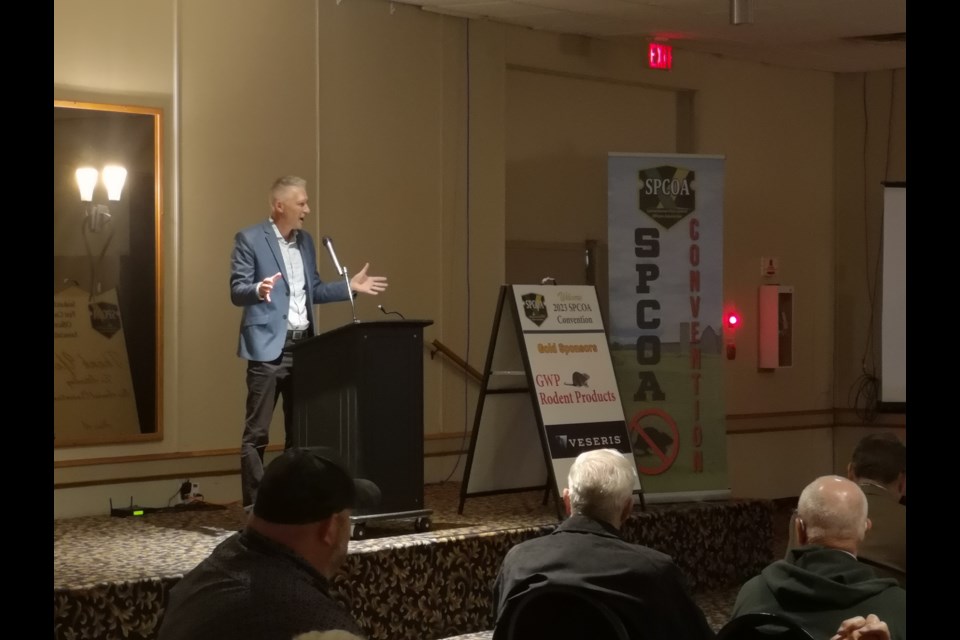Hon. Dana Skoropad, Saskatchewan’s Minister of Environment, addressed a packed room at the Moose Jaw Heritage Inn this week. He was the speaker at the annual convention for the Saskatchewan Pest Control Officers Association (SPCOA).
During his presentation, Skoropad covered invasive species, an update on the Southwest incinerator project, and hunting regulations among other topics. He provided an overview of some regulatory changes and noted what progress is being made.
Invasive species
To provide an example of the impact invasive species have, Skoropad addressed a recent test of Saskatoon storm-water retention ponds.
“So even though it is against both provincial and federal legislation to release that fish into a wastewater stream, many people have done so. Saskatoon has really struggled with this, so we have worked with them… And you can imagine, over 1,000 pounds of goldfish came out.”
As a tool to help provide solutions, Skoropad recommended the iMapInvasives mobile app.
“What this is, is an information management tool for invasive species right across the province… you can filter down to a specific area, a specific species, and get a sense of what is out there, what treatment is being done… and you can download it on a smartphone…”
This app is ideal for those in the agricultural sector, but anyone can download it to track and report invasive species.
Southwest incinerator update
A question brought up by Gerald Wagner with the RM of Fox Valley 171 regarded the Southwest incinerator project. Wagner mentioned that most landfills in the Southwest are already shut down, and burning landfill waste can provide an immediate remedy.
“RMs and towns in the entire Southwest, including Swift Current, got together 4 years ago to try and get an incinerator operational,” said Wagner. “Every time we think we’ve passed the test, environment comes up with another test. We’ve hauled garbage all the way out to Edmonton…
“Our landfills in the whole Southwest are pretty much all shut down now; there’s probably only 3 left,” Wagner added. “If we had an incinerator in the area, we could get rid of a lot of that garbage right now. We’re held up.”
All testing has passed the necessary requirements for public health and safety except for one issue.
“I’ve met with Ketek (Group Inc.), (and) I’ve met with the leadership of the South West Incinerator Group, I want to say 6 weeks ago,” said Skoropad in his reply.
“There is one contaminant that poses a risk to the general public that needs to be reduced.” He noted that Ketek Group Inc. has announced a hopeful modification that they believe can fix the issue.
“I will say this… I committed to (the Saskatchewan Association of Rural Municipalities (SARM)) and I re-committed last week… at Swift Current. My ministry is committed to funding that last round of testing. That’s not going to fall on the backs of the South West Incinerator Group.
“So, we are funding that last round of testing. But it’s important testing; it’s an important piece of technology not just for there but is also a solution for elsewhere.
“We need to make sure we are not harming people at the end of the day,” he explained.
Hunting regulation changes
The meeting also addressed hunting regulations in the province.
Together with conservation officers, SARM is looking for ways to better regulate hunting practices. They have announced a new management tool that is showing promise.
SARM has announced that they seek to establish a “temporary management season” beyond the regular hunting season. This approach will differ based on the region and its wildlife population, and will focus on “controlled wildlife management issues” in select areas.
“Hunting isn’t a perfect venture…” said Skoropad. “So, we are looking at creating a mechanism where we can create a shorter, temporary management season beyond the regular hunting season… for areas that are seeing continued wildlife management issues.”
Skoropad announced that the new approach maps wildlife hotspots in the province, and these management zones will be applied accordingly. Currently they are tracking mule deer and elk, with moose populations to follow.
The program should see an update in time for hunting season this fall.
Another important point regarded muskrat hunting, as conditions are suitable for their numerical increase this year. Due to their classification and without a permit, landowners are only legally permitted to hunt them on their own private property if they prove a nuisance.
The meeting also addressed captive wildlife regulations, disposal of leftover wood in landfills, and Chronic Wasting Disease (CWD) affecting wildlife in the province.
The SPCOA was established on November 21, 1991, and serves as an advocate for comprehensive rat eradication in the wake of the hantavirus outbreak. Their goal is to promote public health, safe product handling, and the mitigation of risks brought on by pests.
The association provides a voice to promote adequate provincial funding for pest control measures.
From its inception, an executive committee was formed to organize an annual seminar where relevant issues from the past year can be addressed, and to provide a focus for the upcoming year.
The SPCOA is based out of Quill Lake, SK, and can be reached at 1-306-287-8271.
The iMapInvasives app can be downloaded here: https://www.imapinvasives.org/.




